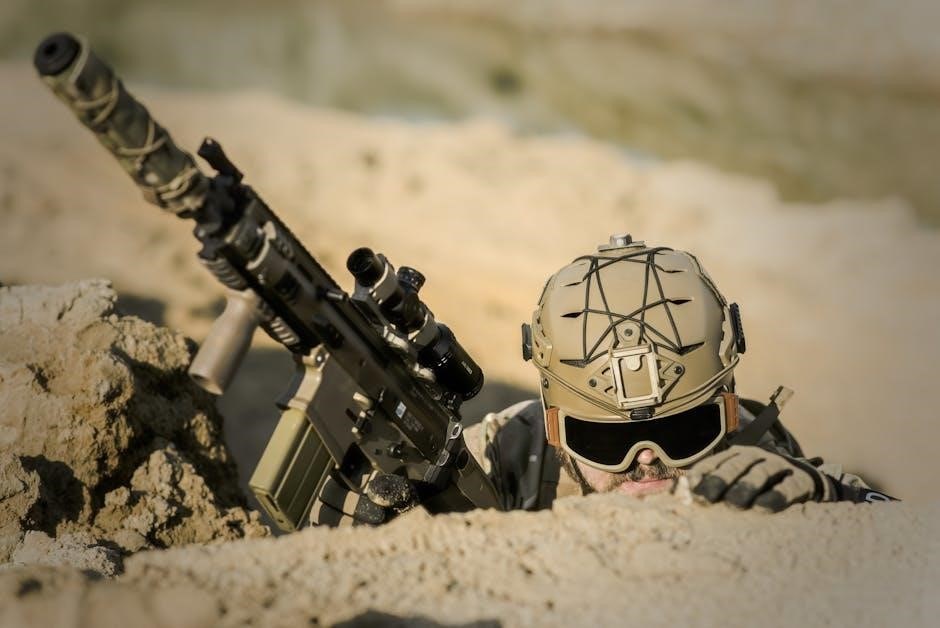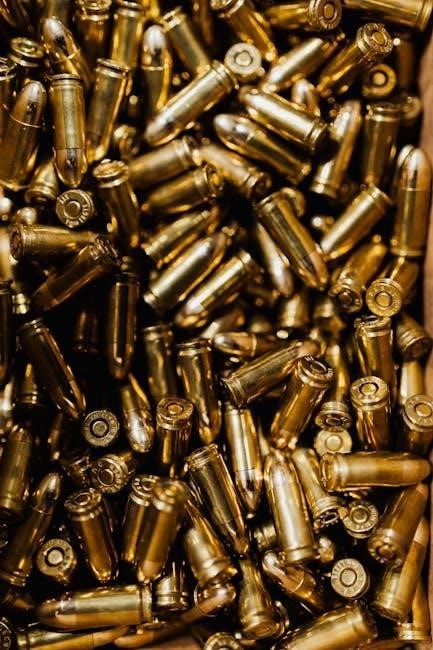Gun trading offers a unique blend of passion and investment, attracting enthusiasts and collectors․ This guide explores the ins and outs of this niche market․
1․1 The History of Gun Trading
The history of gun trading traces back centuries, rooted in the exchange of firearms for survival, protection, and sport․ Early trading often involved bartering between tribes and settlers, with firearms serving as valuable commodities․ As civilizations evolved, so did the complexity of gun trading, influenced by colonial expansion and military conflicts․
The 19th century marked the rise of industrialized firearm production, making guns more accessible and sparking a vibrant trading market․ The 20th century introduced regulatory frameworks, such as the National Firearms Act of 1934 and the Gun Control Act of 1968, shaping modern trading practices․ Today, gun trading is a global phenomenon, blending tradition with technology, and remains a significant part of both enthusiast culture and commercial markets․
1․2 Benefits of Engaging in Gun Trading
Engaging in gun trading offers numerous benefits for enthusiasts and investors alike․ It provides an opportunity to diversify one’s collection, acquiring rare or unique firearms that may appreciate in value over time․ Additionally, trading allows individuals to connect with like-minded collectors, fostering a sense of community and camaraderie․ For those with an eye for investment, certain firearms can serve as tangible assets, potentially yielding significant returns․ Moreover, trading encourages continuous learning about firearm history, mechanics, and market trends, enriching one’s knowledge and expertise․ Whether for passion or profit, gun trading presents a rewarding experience that combines hobby and commerce․

Types of Firearms for Trading
Firearms for trading include handguns, rifles, and shotguns, each catering to different purposes like self-defense, hunting, and sport shooting, offering diverse opportunities for collectors and traders․
2․1 Handguns: Overview and Popular Models
Handguns are highly sought after in gun trading due to their versatility and popularity for self-defense and concealed carry․ Popular models include the Glock 19, known for its reliability, and the Smith & Wesson M&P Shield, favored for its compact design․ Other notable handguns like the SIG Sauer P365 and the Ruger LCP II are prized for their ergonomic features and ease of use․ These firearms often retain their value well, making them attractive for traders․ The demand for handguns remains consistent, driven by practical use and collector interest․ Traders should focus on models with strong reputations for performance and durability to maximize their returns in the market․
2․2 Rifles: Uses and Market Demand
Rifles are highly versatile firearms, widely used for hunting, target shooting, and tactical purposes․ Their popularity in gun trading stems from their precision and range․ Popular models include the Remington 700, known for its accuracy, and the Winchester 70, prized by collectors․ Semi-automatic rifles like the AR-15 also see strong demand due to their versatility․ The market for rifles remains robust, driven by recreational and tactical needs․ Traders should focus on models with a strong reputation for performance and durability, as these tend to hold or increase in value․ Limited edition or collectible rifles can also appreciate, making them attractive investments for savvy traders․
2․3 Shotguns: Versatility in Trading
Shotguns are highly sought after in gun trading due to their versatility in various applications․ They are widely used for hunting, home defense, and sport shooting, making them a popular choice among enthusiasts․ Popular models like the Remington 870 and Mossberg 500 are known for their durability and reliability, often maintaining strong resale value․ Additionally, shotguns come in different gauges, such as 12-gauge and 20-gauge, catering to diverse needs․ Their adaptability to different uses increases their appeal in the market․ Traders often find shotguns to be a stable investment, as their demand remains consistent across different regions and user groups․ This versatility makes shotguns a valuable addition to any firearms collection or trading portfolio․

Legal Considerations in Gun Trading
Understanding legal frameworks is crucial for compliant gun trading․ Ensure all transactions adhere to federal, state, and local laws to avoid penalties and legal repercussions․
3․1 Federal Regulations and Laws
Federal regulations play a pivotal role in gun trading, ensuring compliance and safety․ The Bureau of Alcohol, Tobacco, Firearms, and Explosives (ATF) oversees all firearm transactions․ Key laws include the Gun Control Act of 1968 and the Brady Handgun Violence Prevention Act․ All buyers must undergo background checks, and sellers must be licensed Federal Firearms Licensees (FFLs)․ Certain firearms, like machine guns, are heavily restricted․ The Firearms Transaction Record (Form 4473) is mandatory for purchases․ Additionally, the National Firearms Act (NFA) regulates specific weapons, such as short-barrel rifles and silencers․ Traders must also be aware of age restrictions and prohibitions on sales to felons or individuals with disqualifying misdemeanors․ Adhering to these federal laws is essential to avoid legal consequences and ensure ethical trading practices․
3․2 State-Specific Laws and Requirements
State-specific laws add another layer of complexity to gun trading, as regulations vary significantly across the U;S․ Some states impose waiting periods for firearm purchases, while others have stricter background check requirements․ For instance, certain states mandate universal background checks for private sales, whereas others follow federal guidelines․ Concealed carry laws also differ, affecting how traders transport firearms․ Additionally, some states restrict or ban specific types of firearms, such as assault weapons or high-capacity magazines․ Traders must also be aware of state-specific licensing requirements for dealers and collectors․ Non-compliance with these laws can result in severe penalties, including fines and criminal charges․ Researching and understanding local regulations is crucial for conducting lawful and ethical gun trading activities within any state․
3․3 International Laws and Export/Import
International gun trading is heavily regulated by complex laws and treaties․ The export and import of firearms across borders require strict compliance with both the exporting and importing countries’ regulations․ In the U․S․, for example, the Department of State oversees the export of firearms under the Arms Export Control Act․ Export licenses are mandatory, and the process often involves rigorous background checks and documentation․ International treaties, such as the United Nations Arms Trade Treaty, further govern global firearm transactions․ Traders must also be aware of import restrictions, tariffs, and customs requirements․ Non-compliance can lead to severe legal consequences, including fines and imprisonment․ Understanding these laws is essential for engaging in lawful international gun trading․

The Process of Buying and Selling Firearms
The process of buying and selling firearms involves evaluating the firearm’s condition, negotiating a fair price, and ensuring proper documentation for legal transfer․
4․1 Evaluating Firearms for Purchase
Evaluating firearms for purchase requires careful consideration of several factors․ Start by researching the firearm’s history, including its make, model, and serial number, to ensure it is not stolen or tampered with․ Inspect the firearm for any signs of wear or damage, such as scratches, dents, or rust, which could affect its functionality and value․ Check the barrel and chamber for obstructions or excessive wear․ Test the firearm’s mechanics, ensuring that the trigger, safety, and other components function smoothly․ Additionally, consider the firearm’s accuracy by testing it at a shooting range, if possible․ Finally, compare the firearm’s condition and features to similar models to determine a fair market value․ A thorough evaluation helps ensure a wise and satisfying purchase․
4․2 Negotiation Strategies
Negotiation is a critical skill in gun trading, requiring tact and knowledge․ Start by researching the firearm’s market value to establish a fair baseline․ When making an offer, consider starting slightly below your target price to leave room for compromise․ Be respectful and polite during discussions, as building rapport can lead to better deals․ Highlight the firearm’s condition, rarity, or unique features to justify your offer; Listen actively to the seller’s perspective and be willing to meet halfway․ Avoid aggressive bargaining, as it may sour the deal․ If the terms aren’t favorable, don’t hesitate to walk away—there are always other opportunities․ A balanced approach ensures both parties feel satisfied, fostering a successful transaction․
4․3 Closing the Deal: Documentation and Transfer
Once an agreement is reached, ensure all legal documentation is completed․ This includes background checks, transfer forms, and any required permits․ The process typically involves a licensed dealer to facilitate the transfer, especially for interstate transactions․ Both parties must sign a bill of sale, detailing the firearm’s make, model, and serial number․ Payment should be handled securely, with options like certified checks or cash․ Verify all legal requirements, such as waiting periods or age restrictions, before finalizing․ Once paperwork is approved, the firearm can be transferred․ Keep copies of all documents for personal records․ This step ensures compliance with laws and provides a smooth, transparent transaction for both buyer and seller․

Maintenance and Storage of Firearms
Regular cleaning ensures firearm functionality and longevity․ Use appropriate techniques and products to prevent rust and wear․ Store firearms securely in safes or cases to prevent unauthorized access․
5․1 Cleaning and Upkeep Techniques
Cleaning and maintaining firearms is essential for their functionality and longevity․ Start by disassembling the firearm according to the manufacturer’s instructions․ Use a cleaning rod, brush, and solvent to remove residue from the barrel and chamber․ Wipe down surfaces with a soft cloth and apply a thin layer of lubricant to moving parts to prevent rust․ Regular inspection for wear and tear can help identify potential issues early․ Always store firearms in a dry, secure location to maintain their condition․ Proper upkeep ensures reliability and safety, making it a critical step for both collectors and active users․ Regular cleaning also enhances accuracy and performance, preserving the firearm’s value over time․
5․2 Proper Storage Solutions
Proper storage is crucial for maintaining firearm safety and condition․ Use a high-quality gun safe or cabinet with a locking mechanism to prevent unauthorized access․ Trigger locks are an additional layer of security for individual firearms․ Store guns in a dry, cool environment to avoid rust and corrosion․ Consider using silica gel or dehumidifiers to control humidity․ Ammunition should be stored separately in airtight containers․ Always follow local regulations regarding storage․ For added security, anchor safes to the floor to prevent theft․ Regularly inspect storage areas for signs of moisture or pests․ Proper storage not only protects your investment but also ensures safety, making it a vital practice for responsible gun ownership․ By adhering to these guidelines, you can maintain the integrity and functionality of your firearms over time․

Researching the Market
Market research is essential for understanding firearm values and trends․ Use price guides, auction sites, and forums to gauge demand and identify opportunities for profitable trades․
6․1 Pricing Strategies and Valuation
Pricing strategies and valuation are critical components of successful gun trading․ To determine a firearm’s value, traders often compare similar models, analyze market demand, and review recent sales data․ Identifying market trends is essential for making informed decisions in gun trading․ Trends often emerge from shifts in consumer preferences, technological advancements, and regulatory changes․ Online platforms are invaluable for researching the gun market․ Forums, auction sites, and specialized databases provide insights into pricing, demand, and trends․ Success in gun trading requires emotional discipline, patience, and sharp focus․ Developing a mindset that balances confidence with caution is key to navigating this competitive market effectively․ Cultivating a trader’s mindset is essential for success in gun trading; It involves embracing discipline, staying informed, and making objective decisions․ Emotional attachment to firearms can cloud judgment, leading to poor deals․ A successful trader remains adaptable, resilient, and patient, understanding that opportunities may require time to materialize․ Building knowledge about market trends, firearm values, and negotiation strategies is crucial․ Additionally, setting clear goals—whether for profit, collection growth, or exchanging for better models—helps maintain focus․ Learning from mistakes and staying ethical in transactions fosters long-term trust and credibility within the trading community․ By combining these elements, traders can navigate the competitive landscape with confidence and achieve their objectives effectively․ Successful gun trading demands careful decision-making, avoiding common pitfalls that can lead to financial loss or legal issues․ Overpaying for firearms due to emotional attachment or lack of research is a frequent mistake․ Traders must also avoid rushing into deals without verifying the firearm’s condition or history․ Ignoring market trends can result in purchasing overpriced guns or missing opportunities to sell at peak values․ Additionally, falling for misinformation or misleading descriptions from sellers is a common trap․ Traders should also steer clear of impulsive decisions, ensuring every purchase aligns with their goals․ By conducting thorough research, staying patient, and maintaining a logical approach, traders can minimize risks and make informed, profitable decisions in the competitive gun trading market․ Building connections with fellow traders and enthusiasts is crucial․ Attend events, join forums, and engage with local communities to share insights and opportunities, fostering trust and growth․ Building strong relationships with other traders is essential for success in the gun trading community․ Attend local and national firearm events, join online forums, and engage in discussions to connect with like-minded individuals․ Shared interests and mutual respect lay the foundation for trust, which is critical in this industry․ By fostering these connections, you can gain access to rare firearms, learn about market trends, and uncover hidden opportunities․ Collaborative efforts often lead to mutually beneficial deals, while shared knowledge enhances your trading acumen․ Nurturing relationships also opens doors to mentorship and strategic partnerships, helping you navigate the complexities of gun trading with confidence and expertise․ Forming strategic partnerships is a cornerstone of long-term success in gun trading․ Collaborating with established dealers, collectors, and enthusiasts can unlock exclusive opportunities and resources․ Partnerships often provide access to rare firearms, insider market insights, and shared expertise․ By aligning with trusted individuals or businesses, you can enhance your credibility and expand your network․ Strategic alliances may also facilitate smoother transactions, reduce risks, and open doors to new markets․ Nurturing these relationships requires consistent communication, mutual respect, and a shared vision for growth․ When executed thoughtfully, partnerships can elevate your trading endeavors, fostering a collaborative environment that benefits all parties involved and strengthens your position in the competitive world of gun trading․ Ensuring safe transactions and ethical practices is crucial in gun trading․ Prioritize security, compliance, and sustainability to maintain trust and integrity in all dealings․ Ensuring safe transactions in gun trading involves adherence to legal standards, secure payment methods, and proper documentation․ Always verify the legitimacy of firearms and buyers through background checks․ Conduct transactions in well-lit, public areas or licensed dealerships to minimize risks․ Use secure payment platforms to protect financial information․ Keep detailed records of all sales, including serial numbers and buyer identification․ Store firearms securely to prevent unauthorized access․ Avoid emotional decisions and ensure all parties are aware of local, state, and federal laws․ Prioritize transparency and honesty to build trust and maintain a reputation as a responsible trader․ By following these guidelines, traders can mitigate risks and ensure smooth, lawful transactions․ Safety and legality are paramount in the gun trading community․
Ethical practices in gun trading are crucial for maintaining integrity and trust within the community․ Traders must ensure firearms are sold responsibly, adhering to all legal requirements and avoiding sales to prohibited individuals․ Transparency is key; accurately represent the condition, history, and functionality of firearms․ Avoid misleading descriptions or withholding information․ Respect the privacy of buyers and sellers, safeguarding personal and financial data․ Engage in fair negotiations, avoiding exploitative practices․ Promote safe handling and storage of firearms through education․ Ethical traders prioritize the well-being of the community, refraining from transactions that could endanger public safety․ Upholding these principles fosters a positive reputation and contributes to a responsible gun trading environment․ Ethical practices are not just optional—they are essential for the sustainability of the trade․ Mastering gun trading requires a blend of knowledge, ethics, and discipline․ By combining market insight with responsible practices, traders can navigate this niche effectively and sustainably․ I need to expand that into ․ I should emphasize the key points: passion for firearms, knowledge, ethical practices, staying updated on laws, building a network, patience, and continuous learning․ Also, highlight the balance between hobby and investment․ – Conclude the journey, mention it’s rewarding․ Now, I need to make sure each point is covered succinctly, totaling exactly ․ I’ll draft it, then count the words to ensure compliance․ Let me start drafting: “In conclusion, successful gun trading is a rewarding journey that combines a passion for firearms with financial acumen; It requires a deep understanding of the market, adherence to legal standards, and ethical practices․ Building strong relationships with other traders and staying informed about industry trends are crucial․ Patience and negotiation skills are essential for making profitable deals․ Continuous learning and adaptation will help traders navigate the evolving landscape․ Whether viewed as a hobby or investment, gun trading offers unique opportunities for enthusiasts․ By maintaining a balance between knowledge and responsibility, traders can thrive in this niche market․” In That’s ․ I need to add 28 more․ Maybe expand on the points a bit more without adding new sections․ Let me try: “In conclusion, successful gun trading is a rewarding journey that combines a passion for firearms with financial acumen․ It requires a deep understanding of the market, adherence to legal standards, and ethical practices․ Building strong relationships with other traders and staying informed about industry trends are crucial․ Patience and negotiation skills are essential for making profitable deals․ Continuous learning and adaptation will help traders navigate the evolving landscape․ Whether viewed as a hobby or investment, gun trading offers unique opportunities for enthusiasts․ By maintaining a balance between knowledge and responsibility, traders can thrive in this niche market, ensuring longevity and success in their endeavors․” Counting again: In Now it’s ․ Need 21 more․ Maybe add a sentence about the future or a final tip․ “In conclusion, successful gun trading is a rewarding journey that combines a passion for firearms with financial acumen․ It requires a deep understanding of the market, adherence to legal standards, and ethical practices․ Building strong relationships with other traders and staying informed about industry trends are crucial․ Patience and negotiation skills are essential for making profitable deals․ Continuous learning and adaptation will help traders navigate the evolving landscape․ Whether viewed as a hobby or investment, gun trading offers unique opportunities for enthusiasts․ By maintaining a balance between knowledge and responsibility, traders can thrive in this niche market, ensuring longevity and success in their endeavors․ The future of gun trading is bright for those who approach it with dedication and integrity․” Counting: In of
Factors like condition, rarity, and historical significance also influence pricing․
Using price guides, such as those from Blue Book of Gun Values, can provide a baseline for negotiations․
Additionally, auction sites and forums reveal current market trends․
Understanding these dynamics ensures fair and competitive pricing, whether buying or selling․
Accurate valuation builds credibility and maximizes profitability in the gun trading market․
6․2 Identifying Market Trends
For instance, increased demand for concealed-carry handguns has driven their popularity in recent years․
Hunting rifles with advanced optics are also gaining traction․
Collectors often seek rare or historical firearms, influencing their value․
Monitoring sales data, auction results, and social media discussions helps traders spot emerging trends․
Staying ahead of these trends allows traders to capitalize on opportunities, ensuring profitability and relevance in the competitive gun market․
By tracking these shifts, traders can adapt strategies to align with what buyers are seeking․
This proactive approach is key to long-term success in gun trading․6․3 Utilizing Online Platforms for Research
Using search operators like “intitle:” or “OR” can refine results, helping traders find specific firearms or market patterns․
Social media and enthusiast communities often discuss emerging trends, offering real-time data․
Additionally, online marketplaces reveal what buyers are seeking, aiding traders in making informed decisions․
By leveraging these tools, traders can stay ahead of market shifts and identify opportunities․
Regularly monitoring these platforms ensures a well-informed approach to buying and selling firearms․
This proactive research is crucial for success in the competitive gun trading landscape․
Psychology of Gun Trading
7․1 Developing a Trader’s Mindset
7․2 Avoiding Common Pitfalls in Decision-Making

Networking in the Gun Trading Community

8․1 Building Relationships with Other Traders
8․2 Forming Strategic Partnerships

Safety and Ethical Considerations
9․1 Ensuring Safe Transactions
9․2 Ethical Practices in Trading
So, I’ll outline the main points:
– Highlight the importance of passion, knowledge, and ethical conduct․
– Emphasize staying informed about laws and building relationships․
– Mention patience, negotiation, and continuous learning․
– Balance between hobby and investment․
Now, count the words․ Let me see:
successful
gun
trading
is
a
rewarding
journey
that
combines
a
passion
for
firearms
with
financial
acumen․
It
requires
a
deep
understanding
of
the
market,
adherence
to
legal
standards,
and
ethical
practices․
Building
strong
relationships
with
other
traders
and
staying
informed
about
industry
trends
are
crucial․
Patience
and
negotiation
skills
are
essential
for
making
profitable
deals․
Continuous
learning
and
adaptation
will
help
traders
navigate
the
evolving
landscape․
Whether
viewed
as
a
hobby
or
investment,
gun
trading
offers
unique
opportunities
for
enthusiasts․
By
maintaining
a
balance
between
knowledge
and
responsibility,
traders
can
thrive
in
this
niche
market․
successful
gun
trading
is
a
rewarding
journey
that
combines
a
passion
for
firearms
with
financial
acumen․
It
requires
a
deep
understanding
of
the
market,
adherence
to
legal
standards,
and
ethical
practices․
Building
strong
relationships
with
other
traders
and
staying
informed
about
industry
trends
are
crucial․
Patience
and
negotiation
skills
are
essential
for
making
profitable
deals․
Continuous
learning
and
adaptation
will
help
traders
navigate
the
evolving
landscape․
Whether
viewed
as
a
hobby
or
investment,
gun
trading
offers
unique
opportunities
for
enthusiasts․
By
maintaining
a
balance
between
knowledge
and
responsibility,
traders
can
thrive
in
this
niche
market,
ensuring
longevity
100․ and
101․ success
102․ in
103․ their
104․ endeavors․
successful
gun
trading
is
a
rewarding
journey
that
combines
a
passion
for
firearms
with
financial
acumen․
It
requires
a
deep
understanding
the
market,
adherence
to
legal
standards,
and
ethical
practices․
Building
strong
relationships
with
other
traders
and
staying
informed
about
industry
trends
are
crucial․
Patience
and
negotiation
skills
are
essential
for
making
profitable
deals․
Continuous
learning
and
adaptation
will
help
traders
navigate
the
evolving
landscape․
Whether
viewed
as
a
hobby
or
investment,
gun
trading
offers
unique
opportunities
for
enthusiasts․
By
maintaining
a
balance
between
knowledge
and
responsibility,
traders
can
thrive
in
this
96